Norman L. Geisler Collection (14 vols.)
Digital Logos Edition
Overview
Norman L. Geisler is one of the most theologically and biblically perceptive Christian thinkers of our time. He is recognized as an influential teacher, a discerning apologist, and a prolific author. Thousands have turned to Geisler for spiritual insight, theological acumen, or simply to learn how to understand the Christian faith in the context of skeptical opposition.
The 14-volume Norman L. Geisler Collection combines Geisler’s well-known books into a singular collection. These books capture the recurring themes present in Geisler’s teaching, writing, and ministry—ranging from philosophy and apologetics to theology and biblical studies. The collection includes two volumes in which Geisler thoroughly defends the resurrection, along with additional volumes on miracles and biblical inspiration. Geisler writes at length on important historical and philosophical movements which have shaped Christian history—for better or worse. He also provides timely cultural commentary on everything from Carl Sagan to Star Wars, plus biographical works on Augustine and Aquinas.

- Title: Norman L. Geisler Collection
- Author: Norman L. Geisler
- Volumes: 14
- Pages: 2,239
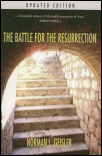
First it was the battle for the Bible; now it is the battle for the resurrection. First the question was whether we can trust what the Bible says about itself; now the question is whether we can trust what the Bible says about the resurrection. First it was whether inspiration covered only spiritual matters but not historical and scientific statements. Now it is whether the resurrection body is only spiritual or whether it is material, and historically and empirically observable. Geisler's powerful book on the resurrection defends and explains this central doctrine in light of recent debate, controversy, and skepticism.
Since the belief in a purely spiritual resurrection of Christ is prevalent in many cults, those involved in countering the rise and growth of cults would benefit greatly from reading this book.
—Walter Martin, author of The Kingdom of the Cults
Dr. Geisler's book is effectively designed as [an] antidote to the misery of turning Christ's factual resurrection into an event outside the bounds of ordinary history.
—Dr. John Warwick Montgomery, author of History and Christianity
Geisler demonstrates not only the danger in the theology of various cults but also the tendency to discount the bodily resurrection of the Lord, even among evangelicals. It is essential reading for every pastor and student.
—Dr. Paige Patterson, author of Song of Solomon
The proclamation that Jesus was raised in the same physical body in which he died is just as important today as it was in the first century. The book signals such a call to the importance of this doctrine.
—Dr. Gary Habermas, Distinguished Professor of Apologetics and Philosophy, Liberty University
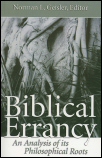
Philosophy has given us insights into the reflections of thinkers on such subjects as God, mankind, the world, and the possibility of knowing ultimate reality. The processes of reasoning and the conclusions of logic are often intensely fascinating. Dr. Geisler reminds us, however, that the premises and the arguments of philosophy are often faulty, leading to a wholly inadequate view of knowledge and revelation. He reiterates Paul's warning to the Colossian Christians: "See to it that no one takes you captive through hollow and deceptive philosophy." The contributors to this volume show how the basic presuppositions of many philosophers lead to a denial of a divine, inerrant revelation. The views of some modern theologians regarding revelation find their roots in such deceptive philosophy.
Contributors to this volume include:
- Norman L. Geisler
- Gary R. Habermas
- W. David Beck
- Winfried Corduan
- E. Herbert Nygren
- Terry L. Miethe
- John S. Feinberg
- Howard M. Ducharne, Jr.
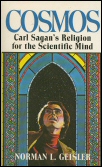
Through his understanding of the cosmos, Carl Sagan has forcefully, though unwittingly, offered mankind a dynamic new religion. Sagan’s religion, however, is not a traditional one. It does not involve worship of a Supreme Being, nor the performing of any particular ritual. Yet Sagan’s religion of science has penetrated deep into the modern cultural consciousness. In this compelling volume, Geisler confronts Sagan’s scientific religion with the truth of Christianity.
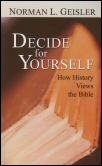
What is the origin of the Bible? To what extent is it inspired? Does inspiration preclude the possibility of error?
These and other questions about the Bible are considered in the author's presentation of both the Bible's statements about itself and the thoughts of various theologians throughout the history of the church. Dr. Geisler presents this material with a minimum of editorial comment, encouraging the reader to decide for himself.
Decide for Yourself examines the view of the Bible throughout history. Chapters include:
- The Bible's View of the Bible
- The Early Fathers' View of the Bible
- The Medieval Fathers' View of the Bible
- The Reformers' View of the Bible
- The Orthodox View of the Bible
- The Liberal View of the Bible
- A Fundamentalist View of the Bible
- The Neoorthodox View of the Bible
- The Liberal-Evangelical View of the Bible
- The Neoevangelical View of the Bible
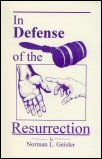
How should we address contemporary critique of the resurrection? In In Defense of the Resurrection, Norman Geisler brings intellectual acumen to address skeptics. He confronts the issue directly, examining critique in light of history, theology, and the words of Scripture itself. In an accessible, easy-to-follow format, In Defense of the Resurrection is a vital apologetic for one of today’s most controversial theological issues.
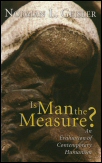
An academically respectable description and evaluation of secular humanism is available at last.
The diversity within humanism receives full recognition in this book, as does the fact that "not everything about humanism is bad from a Christian point of view." Indeed, the author continues, "there are many emphases within humanism that are compatible with Christian beliefs," a thesis to which he devotes an entire chapter.
Part 1 summarizes, in turn, eight prominent forms of humanism: Huxley's evolutionism, Skinner's behaviorism, Sartre's existentialism, Dewey's pragmatism, Marxism, Rand's egocentrism, Lamont's culturalism, and the coalitional form present in the humanist declaration and manifestoes. Emerging from these chapters are both the differences between humanists and the consensus that binds them together. "It is this humanistic consensus," writes the author, "that most radically conflicts with Christian beliefs" and that is "the number one problem in the United States today."
After the chapter on "the helpful emphases of secular humanism," part 2 details this movement's comparative inferiority, internal inconsistencies, religious inadequacies, and philosophical insufficiencies. The final chapter demonstrates that, while Christianity is consistent with the central principles of science, philosophy, epistemology, and ethics, humanism is not. "There is no rational justification," the author concludes, "for being a humanist.
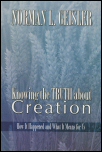
Are human beings a mere product of the cosmos with no future in eternity? Or are we infinitely more valuable than any other creatures on earth? Can we put a price tag on human life? How should we treat marginal members of society: those whiling away empty days in nursing homes, the terminally ill, the unborn child?
Norman Geisler believes that many of us have become confused about these vital issues. In Knowing the Truth about Creation, he delves into the biblical, philosophical, and scientific case for the Christian view of creation. The result is a fascinating look at creation and the Creator.
Dr. Elton Trueblood was right when he said, 'If God is the God of the altar only and not the God of the laboratory also, he is not worthy of our worship.' Norman Geisler proclaims the Lord of the altar and of the laboratory. This book is a great blend of the biblical, philosophical, and practical approaches so needed in our scientific age.
—D. James Kennedy, author of Why I Believe
A competent, up-to-date discussion of creation . . . interesting, clearly written, and faithful to Scripture. I recommend it without reservation.
—Ronald Nash, Professor of Philosophy, Western Kentucky University
A sophisticated, balanced treatment of a subject fundamental to the Christian faith but which many Christians prefer to avoid.
—James Hitchcock, author of What is Secular Humanism?
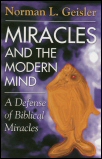
That miracles exist is an important part of the Christian tradition, yet a brief survey of modern thought reveals a marked prejudice against this notion. Here, Geisler shows how the laws of logic and science speak to the reasonableness of miracles. A dispassionate look at the facts and arguments demands that doubters question their own naturalistic assumptions. Geisler also describes "signs," "wonders," and "power," contrasting what the Bible means by a miracle with bizarre stories of saints, faith healers, and occultists. A continuation of his work begun in 'Miracles and Modern Thought', 'Miracles and the Modern Mind' includes extensive revisions and additions.
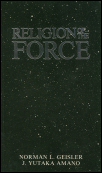
In this compact volume co-authored by Norman L. Geisler and J. Yutaka Amano, the authors explore the religious dimensions of Star Wars, using the film to illuminate the key components of Christianity. Religion of the Force engages Star Wars on its own merits to illustrate the similarities between Christianity and the Force of Star Wars.
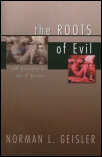
The Roots of Evil is an accessible treatment of the problem of evil, suffering, and pain. Norman L. Geisler addresses the most pressing questions from a Christian perspective about why bad things happen to good people.
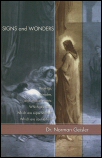
Some Christians claim to be able to heal the sick and even raise the dead. Some people applaud this, while others are skeptical. Are these healers using the power of God? Are they faking? Or is their power from Satan? And what about nonbelievers who also claim to perform wonders? Are they tricksters or agents of the occult? Can we believe their claims about past lives, seeing the future, UFO encounters, and spirit channeling?
Norman L. Geisler takes a sane and solidly biblical look at miraculous healings and other amazing phenomena today. With penetrating insight, he constructs guidelines for judging whether any so-called miracle is truly from God or from the realm of the demonic. Signs and Wonders also includes material on speaking in tongues and on the use of objects in faith healing. In addition, Geisler looks carefully at the clever trickery that charlatans use to dupe and swindle people. He shows that what often passes as supernatural can be explained as merely unusual.
Here is a book for anyone who wonders about the power and the sincerity of those who claim to be wonder-workers.
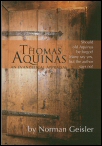
Norman L. Geisler reintroduces evangelicals to the man they "forgot,” clarifying Aquinas' teachings about the nature of God, Scripture, faith, reason, and other key issues of apologetics and ethics. Aquinas, the author argues, "is a more articulate defender of the faith than anyone in our midst.”
Roman Catholic Aquinas scholar Robert N. Campbell observes that Geisler "makes a good case for his message that the writings of Aquinas can be of great value to today's Protestant and Roman Catholic philosophers and theologians.”
"The book gives an understandable presentation of many of Aquinas' major contributions and shows how they are relevant, at times even crucial, to contemporary discussion,” adds Winfried Corduan of Taylor University. "In the process, Geisler strikes a credible blow against the current unfounded prejudice toward St. Thomas in evangelical thought.”
This is 'must reading' for every thinking Christian. I am thrilled by this careful analysis of St. Thomas
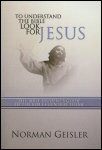
Believing the fundamental Christian claim that the purpose of the Bible is to present the Savior, Geisler focuses on Christ as the unity and unfolding message of the whole of Scripture. Christ is the tie between the Testaments, the content of the canon, and the unifying theme within each book of the Bible.
This book is basic to both Bible study and preaching and serves as an excellent guide to the Bible's central theme. It encompasses far more than a study of types and the Old Testament prophecies. Each chapter takes seriously the affirmation of Jesus: “Everything written about me in the law of Moses and the prophets and the Psalms must be fulfilled” (Luke 24:44).
Related to Geisler's central thrust—that Christ is the clue to the whole Bible—is the clear assertion concerning the inspiration of Scripture and the deity of Christ. Chapter topics include:
- Christ Is the Key to the Bible
- Christ in the Old Testament
- Christ in Both Testaments
- Christ in Every Section of the Bible
- Christ in Each Book of the Bible
- The Word of God; Personal and Propositional
Also included are a bibliography, subject index, and Scripture index.
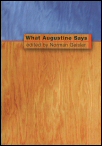
Augustine has been called the greatest man possessed by the Christian church between Paul and Luther. His writings continue to be read and studied, and they continue to influence the church.
But where does one turn to discover what Augustine wrote concerning theological topics such as Scripture, God, Christ, humanity, salvation? How can one find out what Augustine said about the relation between faith and reason, about evil, about ethics?
Identifying the key passages in Augustine's works on any one topic can be exhausting and even impossible for the student. In this volume such passages are quoted, allowing students to become acquainted with one of Christendom's greatest theologians through his own words and in a volume of manageable length.
Each quote or group of quotes is summarized by a sentence heading, which in turn is part of a well-organized outline. In the chapter on faith and reason, for example, the quoted material is divided into these major groupings: (1) reason precedes initial faith, (2) faith precedes full reasoning or understanding, (3) reason or understanding is the reward of faith, (4) reason can stand on its own for faith, (5) reason helps confirm faith, (6) faith goes beyond reason, and (7) faith never goes against reason, nor reason against faith.
The editor has drawn on a wide variety of sources, including Augustine's theological writings, sermons, letters, and Confessions. All quotations are documented, providing the reader easy access to the full context of each excerpt.
Norman L. Geisler has taught at university and graduate levels for nearly fifty years and has spoken, traveled, or debated in all fifty states and in twenty-six countries. He holds a B.A. and M.A. from Wheaton College, a Th.B. from William Tyndale College and a Ph.D. in Philosophy from Loyola University.
After his studies at Wheaton, he became the graduate assistant in the Bible-Philosophy department at the college. He has since taught Bible, Apologetics and Philosophy at Detroit Bible College, Trinity Evangelical Divinity School, and Dallas Theological Seminary, and was Dean of Liberty Center for Research and Scholarship in Lynchburg, VA. In 1992 he co-founded and served as President of Southern Evangelical Seminary in Charlotte, North Carolina, until 2006. Currently, he is professor of Theology and Apologetics at SES.
In addition to the books in this collection, Geisler is also the author of A General Introduction to the Bible and I Don't Have Enough Faith to Be an Atheist, as well as the books in The Norman L. Geisler Apologetics Library and Norman L. Geisler’s Systematic Theology (4 vols.).
Reviews
9 ratings
Don Kemper
3/15/2024
Joseph E
5/16/2021
Curtis Dubreuil
8/4/2016


Greg Johannes
11/29/2013

Franky Wong
10/13/2013

Gregory S. MacBeth
8/8/2013
Phil Niebergall
7/30/2013

Rodrigo Cezare
7/13/2013